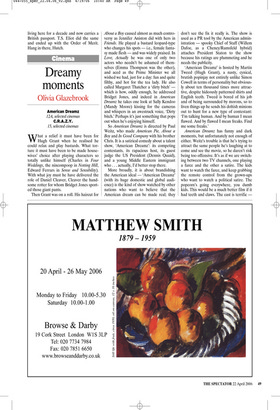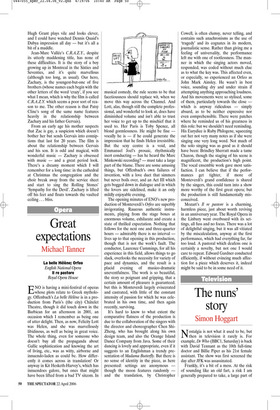Dreamy moments
Olivia Glazebrook
American Dreamz
12A, selected cinemas
C.R.A.Z.Y.
15, selected cinemas
What a relief it must have been for Hugh Grant when he realised he could relax and play bastards. What torture it must have been to be made housewives’ choice after playing characters so totally unlike himself (Charles in Four Weddings, the nincompoop in Notting Hill, Edward Ferrars in Sense and Sensibility). With what joy must he have delivered the role of Daniel Cleaver, Cleaver the handsome rotter for whom Bridget Jones sported those giant pants.
Then Grant was on a roll. His haircut for About a Boy caused almost as much controversy as Jennifer Aniston did with hers in Friends. He played a bastard leopard-type who changes his spots — i.e., female fantasy made flesh — and was widely praised. In Love, Actually he was one of only two actors who needn’t be ashamed of themselves (Emma Thompson was the other), and aced as the Prime Minister we all wished we had, just for a day: fun and quite filthy, and hot for the tea lady. He also called Margaret Thatcher a ‘dirty bitch’ which is how, oddly enough, he addressed Bridget Jones, and indeed in American Dreamz he takes one look at Sally Kendoo (Mandy Moore) kissing for the cameras and whispers in an awestruck voice, ‘Dirty bitch.’ Perhaps it’s just something that pops out when he’s enjoying himself.
So American Dreamz is directed by Paul Weitz, who made American Pie, About a Boy and In Good Company with his brother Chris. It is a satirical comedy about a talent show, ‘American Dreamz’: its competing contestants, its rapacious host, its guest judge the US President (Dennis Quaid), and a young Middle Eastern immigrant who ... actually, I’d better stop there.
More broadly, it is about brandishing the American ideal — ‘American Dreamz’ (with its huge domestic and global audience) is the kind of show watched by other nations who want to believe that the American dream can be made real; they don’t see the fix it really is. The show is used as a PR tool by the American administration — spooky Chief of Staff (Willem Dafoe, as a Cheney/Rumsfeld hybrid) attaches President Staton to the show because his ratings are plummeting and he needs the publicity.
‘American Dreamz’ is hosted by Martin Tweed (Hugh Grant), a nasty, cynical, brutish popinjay not entirely unlike Simon Cowell in terms of personality but obviously about ten thousand times more attractive, despite hideously patterned shirts and English teeth. Tweed is bored of his job and of being surrounded by morons, so to liven things up he sends his doltish minions out to hunt for a new type of contestant: ‘I’m talking human. And by human I mean flawed. And by flawed I mean freaks. Find me some freaks.’ American Dreamz has funny and dark moments, but unfortunately not enough of either. Weitz’s trouble is that he’s trying to attract the same people he’s laughing at to come and see the movie, so he daren’t risk being too offensive. It’s as if we are switching between two TV channels, one playing a farce and the other a satire. The kids want to watch the farce, and keep grabbing the remote control from the grown-ups who want to watch a political satire. The popcorn’s going everywhere, you dumb kids. This would be a much better film if it had teeth and claws. The cast is terrific — Hugh Grant plays vile and looks clever, and I could have watched Dennis Quaid’s Dubya impression all day — but it’s all a bit of a muddle.
Jean-Marc Vallée’s C.R.A.Z.Y., despite its utterly maddening title, has none of these difficulties. It is the story of a boy growing up in Montreal in the Sixties and Seventies, and it’s quite marvellous (although too long, as usual). Our hero, Zachary, is the youngest-but-one of five brothers (whose names each begin with the other letters of the word ‘crazy’, if you see what I mean, which is why the film is called C.R.A.Z.Y. which seems a poor sort of reason to me. The other reason is that Patsy Cline’s song of the same name features heavily in the relationship between Zachary and his father Gervais).
From an early age his mother suspects that Zac is gay, a suspicion which doesn’t bother her but sends Gervais into conniptions that last for 20 years. The film is about the relationship between Gervais and his son. It is odd and magical, with wonderful music — Zachary is obsessed with music — and a great period look. There’s a dreamy moment which I will remember for a long time: in the cathedral at Christmas the congregation and the choir break away from the service sheet and start to sing the Rolling Stones’ ‘Sympathy for the Devil’. Zachary is lifted off his feet and floats towards the vaulted ceiling ... bliss.



































































 Previous page
Previous page